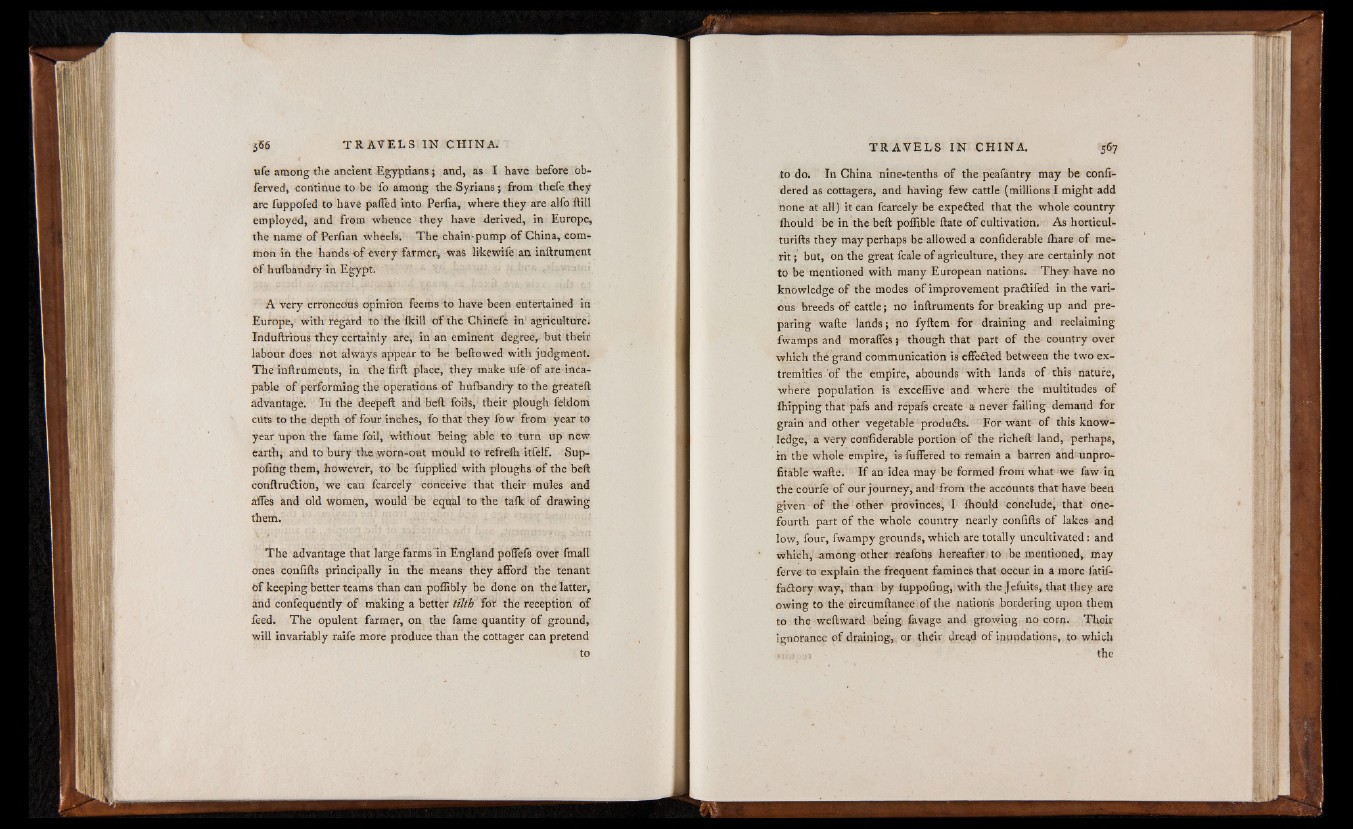
life among the ancient Egyptians,; and, as I have before ob-
ferved, continue to be fo among the Syrians; from thefe they
are fuppofed to have palled into Perfia, where they are alfo ftill
employed, and from whence they have derived, in Europe,
the name o f Perfian wheels. The chain-pump o f China, common
in the hands o f every farmer; was li'fcewife an inftrument
o f hufbandry in Egypt.
A very erroneous opinion feems to have been entertained in
Europe, with regard to the fkill o f the Chinefe in agriculture.
Induftrious they certainly ate, in an eminent degree,- hut their
labour does not always appear to be bellowed with judgment.
The inftruments, in the firft place, they make ufe o f are incapable
o f performing the operations o f hufbandry to the greateft
advantage. In the deepeft and beft foils, their plough foidom
cuts to the depth o f four inches, fo that they fow from year to
year upon the fame foil, without being able to turn up new
earth, and to bury the worn-out mould to refrefh itfelf. Sup-
pofing them, however, to be fupplied with ploughs o f the bell
conilrudlion, we can fcaredy conceive that their mules and
affes and old women, would be equal to the talk o f drawing
them.
T he advantage that large farms in England poffefs over fmall
ones confifts principally in the means they afford the tenant
b f keeping better teams than can polEbly be done on the latter,
and confequdntly o f making a better tilth for the reception o f
feed. The opulent farmer, on the fame quantity o f ground,
will invariably raife more produce than the cottager can pretend
to do. In China nine-tenths o f the peafantry may be confi-
dered as cottagers, and having few cattle (millions I might add
none at all) it can fcarcely be expedled that the whole country
fhould be in the beft poffible ftate o f cultivation. As horticul-
turifts they may perhaps be allowed a confiderable fhare o f merit
; but, on the great fcale o f agriculture, they are certainly not
to be mentioned with many European nations^ They have no
knowledge o f the modes o f improvement pra&ifed in the various
breeds o f cattle; no inftruments for breaking up and preparing
wafte lands;, no fyftem for draining and reclaiming
fwamps and moraffes j though that part o f the country over
whieh thé grand communication is effeâed between the two extremities
o f the empire, abounds with lands o f this nature,
where population is exceffive and where the multitudes o f
Ihipping that pafs and rèpafs create a never failing demand for
grain and other vegetable products. For want o f this knowledge,
a very confiderable portion o f the richeft land, perhaps,
in the whole empire, is foffered to remain a barreri and unprofitable
wafte. I f an idea may be formed from what we faw in
the courfe o f our journey, and'from the accounts that have been
given o f the other provinces, I fhould conclude, that one-
fourth part o f the whole country nearly confifts o f lakes and
low, four, fwampy grounds, which are totally uncultivated : and
which, among other reafons hereafter to be mentioned, may
ferve to explain the frequent famines that occur in a more fatif-
fa&ory way, than by luppofmg, with the Jefuits, that they are
owing to the oircumftanee o f the nations bordering upon them
to the weftward being favage and growing no corn. Their
ignorance o f draining, or their dread o f inundations, to which
the